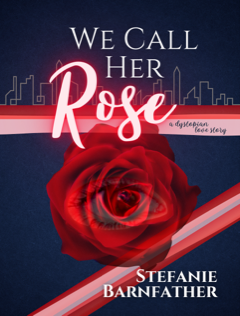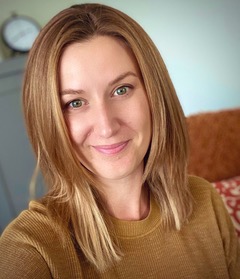

1. Are there any books or authors that inspired you to become a writer?
Anne McCaffrey, Guy Gavriel Kay, and Christopher Moore were my greatest inspirations growing up, and reading Agatha Christie and Margaret Atwood solidified my commitment to the craft as an adult.
2. Do you play music while you write — and, if so, what’s your favorite?
After I’ve finished plotting/planning a book, I create a playlist that reflects the tone of the story and the world(s). I listen to that when I create my media, or when I’m editing, but when I’m writing draft one—or doing revisions—I like silence. You can access my playlists on Spotify, because I share them with readers.
3. Do you prefer ebooks, printed books, or audiobooks most of the time?
I prefer printed books (paperbacks). I like holding (and smelling) books—and digital text gives me headaches. I don’t listen to audiobooks because I don’t like multitasking, and I’m so busy I only listen to audio if I’m driving (and it tends to be music) and I rarely drive anymore. I like to experience storytelling mindfully, so I make the time and take the space to sit with a text and really get into it without distraction. However, I appreciate how important audiobooks are for others.
4. Does writing energize or exhaust you? Or both?
Depends on the story. I am vamped up when I write short stories (SO MUCH FUN), and two of the novels I’ve written have been easy, and energizing, and exciting—but two of my novels were painful to get on paper (usually because the content hit personal ‘ouch’ points, but sometimes because the conflict I created was so complex, and the research was so heavy, it was difficult to condense the info into a ‘readable’ version).
5. Have you ever considered writing under a pseudonym? Why or why not?
Yes, I did. I wanted there to be boundaries between my writing and my personal life. Then I changed my mind—I write under my real name—because I’m terrible at dissembling and wouldn’t be able to maintain a public persona with a fake identity. Plus, I was an actor for years—it’s nice to be an Artist as Stefanie Barnfather, and not someone else’s fiction.
6. Have you ever travelled as research for your book?
Not intentionally, but when I travel for fun I note interesting people/places/discoveries and incorporate them into my work. For example, a location in We Call Her Rose was inspired by Chicago and Montreal’s subway systems—we don’t have subways in Calgary.
7. What has helped or hindered you most when writing a book?
Helped: General encouragement from my family, readers, friends; space and time to think/reflect/research; when humans trust that I can do my job, not tell me how to do my job; when other published authors share resources for career development; laughing about the complexities of the artistic/publishing process; sharing writing love with others; and finding avenues that support the broader writing/artistic/human community.
Hindered: Distractions; getting emails from readers telling me in explicit detail what’s “wrong” with my writing (doesn’t happen often, but it has happened)—I use quotes because I’ve never received feedback framed as ‘right’ or ‘wrong’ that I’ve found to be particularly helpful; and internal, self-loathing demons, which I’m getting better at compassionately managing.
8. What part of the book was the most fun to write?
The combat. I have light training in stage combat, so writing fight scenes is easy and enjoyable; and it’s interesting exploring the violent nature of humanity on a page, and in a safe, monitored, educated setting—rather than in real life. I’m not a physically violent person (the thought of punching someone for reals is totally foreign to me), but the reptile-brain impulse is there, so it’s a holistically fulfilling exercise to act out those impulses on paper.
9. What risks have you taken with your writing that have paid off?
Publishing my first book—the compilation of short stories, You Know What I Think. Before 2022 I didn’t really believe I could be a meaningful contributor in the writing community, so taking that leap and putting my work out into the world for public consumption was terrifying. Super glad I did, though. Readers have been extremely kind and supportive about my stories.
10. Would you and your main characters get along?
I wouldn’t have any tolerance for Rose’s defensive shenanigans, but I would understand (and respect) her struggles—we couldn’t be friends though, because I would want to shake her twenty times a day and yell, “Stop being so hard on yourself, you silly woman!” Collin and I would be friends. We’d just low-key chill, and talk about history, and pretend the world wasn’t scary.